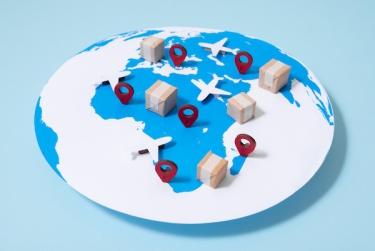However, the main caveat being that you need to find a way to successfully navigate different regulations, protocols, and logistics networks in unfamiliar territories. All of this requires a significant investment of time, effort, and resources - not to mention expertise. Talk about a headache.
But here’s the good news - instead of stumbling through it alone solo and trying to overcome the challenges of shipping your products internationally, there is a whole industry out there that has been built to take care of all the heavy lifting for you. Enter freight forwarders.
Dating back to the early 1800s, this specialized industry has evolved to cater to the complex needs of global trade - and its been given a digital makeover to help businesses navigate the ever-changing landscape of international logistics with greater ease and efficiency than ever before.
What is Digital Freight Forwarding?
To put it into simple terms, digital freight forwarders act as logistics platforms that take a data-driven, technology based approach to help simplify global shipping for businesses. But what does this actually look like in the real world?
Well, much like traditional freight forwarders, these digitally enabled platforms handle all of the critical aspects of the shipping process - procuring cargo space with carriers, preparing documentation, warehousing, and even customs clearance. Basically, you can think of it like a one-stop-shop concierge service for getting your products from point A to point B.
However, since they are fully digitized, digital freight forwarders can do all this much more quickly and efficiently through the use of seamless online coordination. This gives companies of any size the power to expand globally in a streamlined way, without struggling with complex logistics operations across disjointed solutions. So, if the fear of managing the stress of global logistics has been putting you off your quest for global domination, these digitally-enabled forwarders could be the answer you’ve been looking for.
How Digital Freight Forwarders Facilitate Seamless Market Access
Like most industries, the digital revolution has brought a wide span of benefits to the companies that have been able to adapt the latest tech to help drive more value to the end customers - and freight forwarding is no different. Let's quickly take a look at some of the main benefits that these digital freight forwarders now offer to their customers, particularly when compared to their more-traditional counterparts.
Instant quotes & bookings
Thanks to instant connectivity with an immense network of ocean, air, and truck freight carriers, digital forwarders can provide live pricing and departure details in seconds after an online shipment request. Companies can book logistics on the spot based on their timeline, budget and cargo needs without lengthy back and forth negotiations.
Lower costs
Since they maintain relationships with multiple carriers and can gather large shipments headed to the same location, these platforms have major leverage to score bulk discounts. We're talking big time savings they can pass onto companies of all sizes, not just the larger enterprises. Coupled with automation capabilities that cuts overheads, and companies can ship overseas at extremely competitive rates! This makes expanding into new markets much more affordable.
End-to-end transparency
Digital freight forwarders give you much more transparency into everything going on with your shipments. Old-school freight forwarders often played a "need-to-know" game that left companies in the dark. This resulted in a catalogue of issues that would eventually result in delays and other issues for the end customer. Now, thanks to these digitally enabled platforms, companies can enjoy real-time tracking backed with data analytics telling them where their inventory is at 24/7. Total supply chain transparency.
Customs Clearance Assistance
Every country has its own set of customs procedures and trade regulations spanning duties, taxes, restricted items lists, and declaration forms. Digital forwarders have dedicated customs teams familiar with all destination formalities. They prepare and submit the exact documents on the importer's behalf for smooth clearance and release of goods. No market entry know-how is required.
Overseas Warehousing & Fulfillment
For online sellers, finding and managing foreign distribution centers can be an obstacle in market expansion. Digital forwarders offer built-in warehousing/fulfilment services through overseas partner warehouses. Companies can stock inventory abroad in markets they want to penetrate while the forwarder handles storage and local ordering logistics.
Door-to-Door Delivery
Digital platforms give SMBs the same shipping capacities multinational corporations leverage. That includes comprehensive port-to-door transport both abroad and domestically from the origin warehouse to the final shop. Forwarders can dispatch shipments to make the overseas leg via ocean or air freight. Then, upon arrival, they coordinate trucking for direct store delivery in the new market. It’s a full end-to-end service that takes all of the logistical concerns away from the business owner.
Final Word
When it comes down to it, partnering with tech-savvy freight forwarders is the best bet for modern businesses looking to go global quickly and affordably. These logistics companies have got the process streamlined through their smart online platforms that handle everything - quotes, bookings, paperwork, customs, tracking, analytics - on one easy-to-use dashboard. It makes scaling across borders and managing global supply chains much smoother sailing.
With them handling all the intricate logistics behind the scenes, suddenly, the whole world opens up for effortless trade and rapid expansion into new territories. It's a plug-and-play global market any business can access at the click of a button now.
Sure, traditional freight forwarders still play a role for more complex shipping scenarios. But when every company now has the ability to dominate global markets from their laptop, these digital forwarders are soon to become standard operating procedure for imports and exports in our increasingly connected world.










































